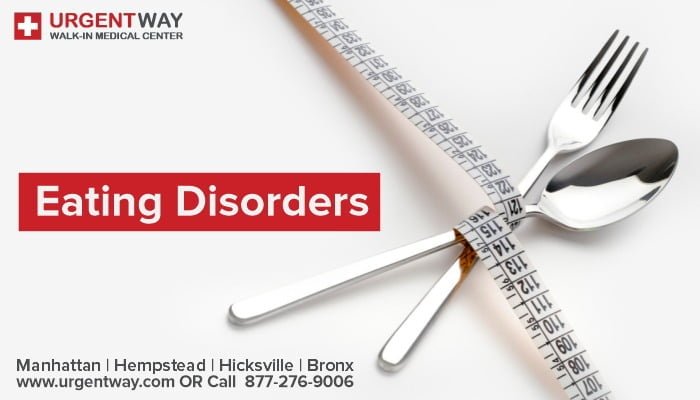Eating disorders are life-threatening conditions that disrupt a person’s emotional and physical well-being. They are real, complicated, and painful conditions with significant implications for health, productivity, and relationships. Eating disorders can damage every organ system in the body. Thus, those who are suffering from them should get expert care. The sooner someone with an eating disorder seeks help, the better their physical and emotional recovery chances are. Stomach pain and bloating are Gastrointestinal (GI) complications that arise due to bacterial infections. Heartburn, gas, bloating, early fullness, nausea, abdominal distention, rectal pain, constipation, or diarrhea might be considered simply “irritable bowel syndrome” due to an underlying eating disorder. Stomach pain and bloating eating disorders cause discomfort and may lead to Crohn’s disease. Anorexia nervosa and bulimia are severe eating disorders that are caused by bacterial infections. Gut microbiota dysbiosis is responsible for bacterial infection in anorexia. Patients with anorexia nervosa in the acute phase have physical complications, such as bacterial infections in the stomach and gut. Physical signs and symptoms of eating disorders are stomach pain and bloating, nausea, fluctuations in weight, dizziness, dry skin, and muscle weakness.
Common health issues of eating disorders
Cardiovascular system
When you eat fewer calories than you need, your body begins to break down its organs\tissues for fuel. Muscles are among the first organs to break down, and the heart is the most vital muscle in the body. When the heart has less energy to pump blood, heart rate, and blood pressure levels fall, resulting in the rise of heart failure. Your body loses critical compounds called electrolytes when you vomit or use laxatives. Potassium, an electrolyte that helps the heartbeat and muscles contract, is frequently low during purging. Other electrolytes, such as sodium and chloride, might become unbalanced due to purging or excessive water consumption. Imbalances in electrolytes can cause irregular heartbeats, heart failure, and death.
Gastrointestinal system
Gastroparesis is a term for slowed digestion. Food restriction or vomiting prevents the stomach from emptying normally and nutrients from being digested, which can lead to:
- Stomach pain and bloating
- Nausea and vomiting
- Blood sugar fluctuations
- Blocked intestines from solid masses of undigested food
- Bacterial infections
- Feeling full after eating only small amounts of food
Neurological
Although the brain is only three pounds in weight, it uses up to one-fifth of the calories used by the body. Dieting, fasting, self-starvation, and unpredictable eating deprive the brain of the energy it requires, leading to food obsession and concentration problems. At bedtime, extreme hunger or fullness might make it difficult to fall or remain asleep. The body’s neurons require an insulating, protective layer of lipids for the smooth passage of messages. Numbness and tingling in the hands, feet, and other extremities might result from a lack of fat in the diet.
Endocrine
The fat and cholesterol we eat provide the body with many of the hormones it requires. Hormone levels, such as sex hormones estrogen and testosterone, and thyroid hormones, might fall if there aren’t enough fat and calories in the diet. Menstruation may fail to start, become irregular, or stop entirely due to low sex hormones. Reduced sex hormones can cause bone loss and raise the risk of broken bones and fractures. Core body temperature will drop if there isn’t enough energy to feed its metabolic fire, and hypothermia may occur. High cholesterol levels can be caused by starvation; however, this is not enough to limit dietary fats, lipids, or cholesterol.
Other health issues of eating disorders
- Low calorie and fat intake can lead to dry skin and brittle hair that falls out.
- During times of starvation, the body will develop fine; downy hair called lanugo to keep warm.
- Kidney failure can occur as a result of severe, sustained dehydration.
- An inadequate diet can cause a reduction in the quantity of specific blood cell types.
- Anemia is caused by a lack of red blood cells or a lack of iron in the diet. Fatigue, weakness, and shortness of breath are some of the symptoms.
- Malnutrition can also reduce the number of infection-fighting white blood cells in the body.
Stomach pain and bloating are the primary symptoms of eating disorders. Bacterial infection can be a leading cause of eating disorders or bacterial infection in the stomach or gut. These eating disorders include nausea, anorexia nervosa, bulimia, etc. These disorders have negative health issues for all body parts and systems. The early symptoms of stomach pain and bloating, gut bacterial infection, rectal pain, nausea, and constipation lead to irritable bowel syndrome. Eating disorders can disturb the electrolytes, resulting in irregular heartbeat, heart failure, and death. In addition, it can impose negative health issues on the gastrointestinal system, neurological system, and endocrine system. Moreover, it can cause anemia, lanugo, shortness of breath, fatigue, and bacterial infection as nausea, vomiting, fever, diarrhea, belly cramping, and pain.


